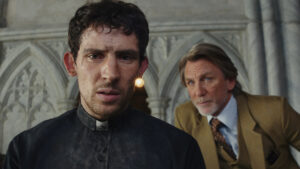This October marks 500 years since a German monk named Martin Luther unwittingly began the Protestant Reformation. This anniversary has been commemorated through books, conferences, and now a documentary film about the Reformation’s leading light: Luther: The Life and Legacy of the German Reformer.
I interviewed Stephen McCaskell, the film’s director, and Barry Cooper, its host and narrator, about how the project came together, why everyday Christians should care about Luther, and how we can honor an historical figure without engaging in hagiography.
What's the story behind this documentary? Whose idea was it originally—and how long has it been in the works?
McCaskell: Six months after we launched Through the Eyes of Spurgeon in 2015, a friend reminded me that the 500th anniversary of Luther’s 95 Theses was coming up, so the timing was perfect to make a new documentary.
There are other Martin Luther documentaries out there, of course, but we felt we could bring him to life in a way that none of the others had.
Cooper: I did stand-up comedy when I was a student, so I’ve always had a soft spot for Luther. It’s a less-than-crowded field, but he’s still one of the funniest theologians you’re ever likely to read.
I became attached to the project when Aaron Armstrong (writer of Luther) reviewed a book of mine for The Gospel Coalition, and he recommended me to Stephen. So thank you, TGC.
From the animation to the on-site footage to the far-ranging interviews, it's clear Luther didn't skimp. What did fundraising look like for this project?
M: After a successful Kickstarter campaign, I brought the project to a group of brothers from California and pitched them the project as an investment opportunity and as a way to serve and edify the church. This helped us secure the remainder of the funding.
Actually, Luther would have cost three-times the amount we raised, except that we assembled a production team of incredibly gifted and generous people who believed deeply in the project. Almost every member of the team worked on the project for a drastically reduced rate.
Why should the everyday, rank-and-file Christian care about Luther's life and legacy?
C: Michael Horton makes the point that the phrase “semper reformanda” is a passive verb. In other words, it’s not “always reforming,” it’s “always being reformed.”
That’s crucial for every Christian to understand. Whatever the cultural pressure, we don’t reform Scripture. Scripture reforms us.
M: The motto of the Reformation was “ad fontes” (“back to the sources”). And that’s a wonderful picture for Christians to have in mind every day. Let’s get back to the sources, back to Scripture.
Yes, there was “the Reformation.” But there must also be an ongoing mini-Reformation inside every believer, as we hear God speaking through his Word.
The film doesn't skirt around Luther's alleged anti-Semitism. In fact, it's mentioned in the opening minutes. How did those who made the film seek to honor Luther without indulging in hagiography? How would you respond to critics who say you didn't go far enough?
M: We wanted to make sure we walked the line well, so we worked closely with some of the top Luther scholars in the world. We felt it would be dishonest to ignore the issue.
C: There’s great benefit in confronting it. Apart from anything else, it’s humbling. If as great a biblical exegete as Luther could write those things, then how much more careful must we be as we come to Scripture?
Every generation has its blindspots—in Luther’s time, open hostility toward Jewish people and ideology was commonplace—so the humbling question to ask is, “What are my cultural blindspots? What will a future generation see in me that will rightly horrify them?”
At the same time, it’s important to see that Luther’s objection was never racial, but theological. He saw that any compromise with “works righteousness” is an act of vandalism against the beauty of God’s gospel.
M: As for whether we went far enough, I think it’s also good to acknowledge that in his earlier writings, Luther was extraordinarily counter-cultural in the way he defended the Jewish people. He wanted them to be treated in a spirit of Christian love, with the same respect afforded to any other German.
The film only features interviews with evangelical Protestants. Why did you choose not to involve any Catholics, non-evangelical Lutherans, or non-Christian historians?
M: There’s always a danger in documentary filmmaking that if you try to say too much, you can end up saying very little.
So although the film is mindful of other views of Luther, we quite unapologetically wanted to come at the subject from a Reformed perspective. Hence the interviews with R. C. Sproul, Carl Trueman, Stephen Nichols, Robert Kolb, Robert Godfrey, and Steven Lawson.
How does the film apply lessons from Luther's life to our contemporary moment?
C: Many of us are caught in a social and political current where to speak faithfully as a Christian—even when we do it with the utmost care—is to be derided as a devil.
His opponents thought Luther was a devil, too. But he responded by continuing to speak clearly of Christ and his gospel of grace. He didn’t back down or pretend that confrontation was avoidable for Christians. He went where Scripture and his conscience took him, even when he knew it might well cost him his livelihood or his life.
Though his most famous line is most likely apocryphal (“Here I stand, I can do no other”), it stuck to Luther because it’s such a good summation of his ethos. It also reminds us of what every follower of Christ must be: a joyful captive of the Word.
Free eBook by Tim Keller: ‘The Freedom of Self-Forgetfulness’
 Imagine a life where you don’t feel inadequate, easily offended, desperate to prove yourself, or endlessly preoccupied with how you look to others. Imagine relishing, not resenting, the success of others. Living this way isn’t far-fetched. It’s actually guaranteed to believers, as they learn to receive God’s approval, rather than striving to earn it.
Imagine a life where you don’t feel inadequate, easily offended, desperate to prove yourself, or endlessly preoccupied with how you look to others. Imagine relishing, not resenting, the success of others. Living this way isn’t far-fetched. It’s actually guaranteed to believers, as they learn to receive God’s approval, rather than striving to earn it.
In Tim Keller’s short ebook, The Freedom of Self-Forgetfulness: The Path To True Christian Joy, he explains how to overcome the toxic tendencies of our age一not by diluting biblical truth or denying our differences一but by rooting our identity in Christ.
TGC is offering this Keller resource for free, so you can discover the “blessed rest” that only self-forgetfulness brings.


































